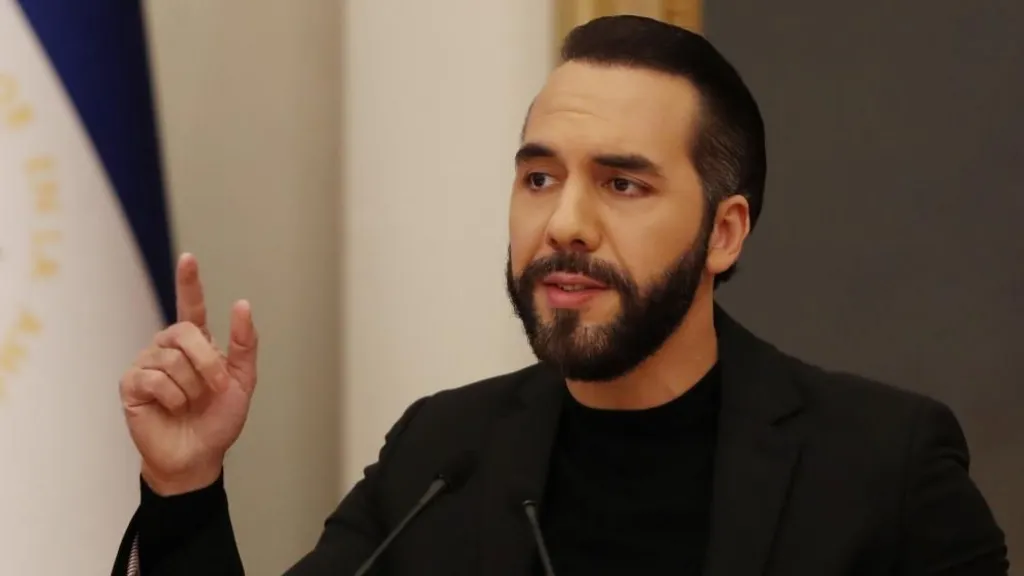By Dimitris Kouvaras,
If you find yourselves asking why I am calling El Salvador’s 44-year-old, controversial president Nayib Bukele a “Philosopher King”, that’s actually his self-description from his X account. On July 31st, the legislative assembly of El Salvador voted to amend the country’s constitution to permit unlimited re-elections to the presidential office, while also extending presidential terms from five to seven years. These developments could therefore see Bukele staying at the helm of the small Central American Nation for many years to come. Taken together, the lifting of constitutional provisions and the president’s platonic self-reference on social media have much to say about the threat and the form of contemporary authoritarianism, in El Salvador and beyond.
Nayib Bukele defends the change of constitutional provisions by referring to the fact that most countries have no limits regulating how many times their head of government is elected, while also pointing out that members of El Salvador’s legislature and other state office holders did not face similar restrictions. Above all, his environment claims that the measure provides empowerment to the people of El Salvador, among whom Bukele is highly popular. This is a characteristic example of populist discourse unravelling in the defence of potentially destabilising political acts. Given Bukele’s own political past, the country’s political landscape and recent history, El Salvador has become a candidate for authoritarianism, and only time will tell how the president’s moves will affect the state of democracy. However, some opposition figures are bracing for the worst: Congresswoman Marcela Villatoro already declared that “democracy is dead in El Salvador”.

While the statement might sound absolute, many factors converge to show that El Salvador’s political scene is thrown further out of balance by the recent decision. Most importantly, it is not the first time that Bukele and his party, “Nuevas Ideas”, meddle with the constitutional writ. When elected in 2019, Bukele originally had margins for only one term, as the constitution prohibited consecutive re-election. Nevertheless, on the 3rd of September 2021, El Salvador’s newly re-staffed Constitutional Court provided an alternative interpretation that enabled a re-election, after all five original magistrates of the Court had been unlawfully removed from office by the National Assembly in May that same year, together with the Attorney General. At the time, the abuse of the separation of powers drew criticism from the Inter-American Court on Human Rights and the Biden administration, with the former stressing already the threat of a slippery slope towards indefinite re-election. Now, the danger is real.
What is also alarming is that both constitutional amendments –or abuses, depending on the perspective– stem from acts of Parliament rather than the presidency itself. Unlike Donald Trump’s executive orders in the US, which have caused friction with Congress over jurisdiction, in El Salvador, the increasing authority of the executive is actively facilitated by the legislature. This comes as no surprise, as “Nuevas Ideas” holds a whopping 90% of seats in the National Assembly, while the largest opposition party, “ARENA”, only holds two. Meanwhile, a similar, if not as pronounced, imbalance pertains also to regional administration, with the government coalition being by far the most popular among El Salvadorian mayors. As a result, the supermajority of the governing party in the legislative assembly and its alignment of interests with Bukele provide the perfect mechanism for corroding constitutional checks and balances under the guise of democracy, where opposition –or the judiciary– have little means to prevent abuses.
Last but not least, Bukele has one more ace up his sleeve. He finds himself and his government in a favourable position, since he has ensured the backing of Donald Trump as a strategic ally in Central American affairs, thereby removing former hindrances such as human rights criticism. In a clever move, he forged their amicable relationship by offering to host many US deportees in El Salvador’s high-security prisons. Popular at home and with powerful allies abroad, Bukele is therefore well equipped to maintain his position as head of state.
However, why exactly is he so popular as to dominate El Salvador’s political scene completely, and why haven’t constitutional reforms cementing his power triggered a public reaction? The fact that authoritarian tendencies not only remain unchallenged but seem to be rewarded politically in El Salvador makes Bukele an interesting case study for the form and strategies of contemporary authoritarianism. Being a popular social media figure with over 10 million followers on Instagram and 7.6 million on X, whereas his country’s population is only around 6.3 million, seems to be a key element in disseminating his political message, as well as forging a pseudo-direct relationship to the electorate at home and admirers abroad. Social media can, therefore, pay lip service to the populist discourse of leaders with potentially authoritarian aspirations such as Bukele, since they provide a clear, visual, and easily perceptible message, which gives the impression of directedness and personalisation to each viewer-follower. Such populism is combined with a “big tent” political approach, which appears to shed traditional identifications with the Left or the Right, drawing in a larger audience. Given the memories of civil war in El Salvador, a unifying party such as “Nuevas Ideas” has enormous potential.

Bukele has exploited this potential, selling his profile through emphasis on creating a safe country, taking advantage of El Salvador’s tumultuous legacy of criminal gangs. A decisive crackdown took place since 2022, which saw the continuous declaration of a state of emergency that is still renewed by the National Assembly every three months and has enabled the arrest of around 85.000 people, all of whom await trial. According to NGOs focusing on human rights, torture and abuse of personal rights have been an integral part of the operation. Nevertheless, the reduction of the country’s murder rate to 1.9% by 2024, below that of the US, earned Bukele an enormous popularity that persists. In a country ravaged by gangs and with fresh memories of the civil war that ended as late as 1992, the enforcement of strict order is perceived as a balm rather than an infringement on democratic liberties. Meanwhile, the president’s accounts abound in footage of the country’s exemplary penitentiary and rehabilitation system, with thousands of inmates participating in industrial production to reduce their sentences.
Going back to the president’s self-description from the beginning, Bukele wants to be seen as the “Philosopher King” presiding over this system and ensuring its proper function with the knowledge only he possesses. On his side is his supportive family, which is projected as yet another testament of character, balancing the forcefulness of the crackdown with an affectionate aura. The problem, however, is that Plato’s philosopher kings did not have a personal family, but rather raised their children in a commune, to devote themselves to the city’s service; they neither had social media to project their image, nor were they dependent on populist tactics. What’s more, they corresponded to an imaginary society based on the values of the 4th century B.C. Outside of Plato’s philosophical realm, any claim to such exclusive political knowledge is extreme at best, and dangerous at worst. El Salvador should keep a close eye on Bukele’s actions lest his presidency go rogue.
References
- International Community Must Push Back Against Consecutive Attacks on El Salvador’s Democracy. Washington Office on Latin America. Available here
- Nayib Bukele could now rule El Salvador for life. The Economist. Available here
- Opposition leaders say ‘democracy in El Salvador has died’ after scrapping of presidential term limits. The Guardian. Available here




